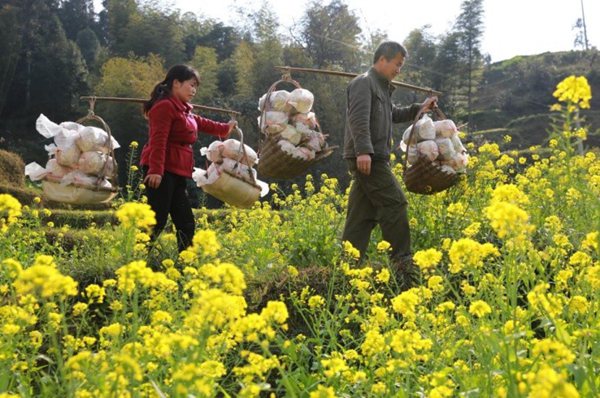

 |
| Residents of Huaibao in Liuzhou, southern China's Guangxi Zhuang Autonomous Region, carry harvested ganoderma. The government has provided more than 40,000 ganoderma as well as technical and sales services to local residents to help lift them out of poverty. (Photo by People’s Daily Online) |
Food and clothing shortages must be solved to alleviate poverty, a Chinese official pledged recently, in China’s latest vow to get tough in war on poverty.
To make sure its poverty alleviation policies are effective, China has promised the strictest assessments as well as a strict cap on the number of impoverished people.
Besides food and clothing, basic education, medical care and housing security must be guaranteed, Liu Yongfu, director of the State Council Leading Group Office on Poverty Alleviation and Development, said at a media briefing on the sidelines of the NPC session in Beijing.
China’s 2017 government work report requires local authorities to effectively implement an accountability system and apply the strictest assessment for poverty alleviation. In the report, the Chinese government also promises stern punishments against deception, falsification, and manipulation of statistics, so as to ensure the policies can really benefit the public and withstand the test of history.
Liu cited an example to introduce the stricter assessments and higher threshold. “An average annual income of 5,000 yuan ($723) is not enough for a family who has college students, given that the yearly cost of university education rises to 20,000 to 30,000 yuan," Liu explained.
He added that a family with patients who have to pay an unaffordable amount of money for medical treatment cannot be assessed as a non-impoverished household, though their incomes may have reached the required thresh-old.
Poverty eradication is not an easy task for China. According to the standard set by the central government, a re-gion can only beat poverty after the local impoverished population drop to less than 2 percent of its total rural population, while those failing to meet the requirements have to keep the title.
Jinggangshan, southeast Jiangxi Province, according to Liu, finally bear poverty after a series of stern assessments.
After the city applied to delist itself from the impoverished regions at the end of February, a third-party assessment was organized by the State Council poverty relief office. The working team, after surveying 80 per-cent of local residents lifted out of poverty in 2016 and two-thirds in previous years, concluded that the local poverty incidence was at 1.6 percent.
In addition, over 90 percent of surveyed local residents recognized local governments’ efforts to wipe out poverty, Liu said, adding that such cases can be verified.
However, some citizens are reluctant to be lifted out of poverty, worrying that favorable policies would be canceled.
Liu reassured them that those policies will remain after the poverty-stricken areas are delisted, adding that such a decision aims to consolidate the results and prevent re-impoverishment.
China lifted 12.4 million citizens out of poverty in 2016, surpassing its annual target. According to this year's government work report, at least another 10 million people will be relieved from poverty in 2017.
Fan Xiaojian, member of the National Committee of the Chinese People's Political Consultative Conference and director of the advisory committee of the State Council Leading Group Office of Poverty Alleviation and Development, said that there are still 43 million poor people in China.
In order to meet the target of poverty reduction for the rural population before 2020, at least 10 million people must be lifted out of poverty each year, Fan noted.
 Fire brigade in Shanghai holds group wedding
Fire brigade in Shanghai holds group wedding Tourists enjoy ice sculptures in Datan Town, north China
Tourists enjoy ice sculptures in Datan Town, north China Sunset scenery of Dayan Pagoda in Xi'an
Sunset scenery of Dayan Pagoda in Xi'an Tourists have fun at scenic spot in Nanlong Town, NW China
Tourists have fun at scenic spot in Nanlong Town, NW China Harbin attracts tourists by making best use of ice in winter
Harbin attracts tourists by making best use of ice in winter In pics: FIS Alpine Ski Women's World Cup Slalom
In pics: FIS Alpine Ski Women's World Cup Slalom Black-necked cranes rest at reservoir in Lhunzhub County, Lhasa
Black-necked cranes rest at reservoir in Lhunzhub County, Lhasa China's FAST telescope will be available to foreign scientists in April
China's FAST telescope will be available to foreign scientists in April "She power" plays indispensable role in poverty alleviation
"She power" plays indispensable role in poverty alleviation Top 10 world news events of People's Daily in 2020
Top 10 world news events of People's Daily in 2020 Top 10 China news events of People's Daily in 2020
Top 10 China news events of People's Daily in 2020 Top 10 media buzzwords of 2020
Top 10 media buzzwords of 2020 Year-ender:10 major tourism stories of 2020
Year-ender:10 major tourism stories of 2020 No interference in Venezuelan issues
No interference in Venezuelan issues
 Biz prepares for trade spat
Biz prepares for trade spat
 Broadcasting Continent
Broadcasting Continent Australia wins Chinese CEOs as US loses
Australia wins Chinese CEOs as US loses